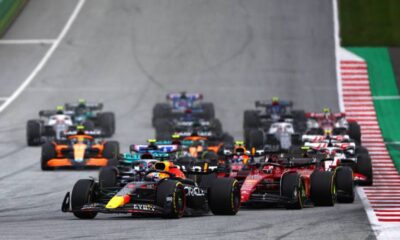Football
Rise and fall. What happened to China’s ambitious plan to become a football power?
In 2016 and 2017, the Chinese Football League stunned the world with its crazy investments, transfers and overpaying of famous footballers. A lot of these clubs have fallen on hard times and some have fallen completely.

In 2016 and 2017, the Chinese Football League stunned the world with its crazy investments, transfers and overpaying of famous footballers. A lot of these clubs have fallen on hard times and some have fallen completely.
When the Chinese Super League broke the Asian transfer record five times in the space of a year, it seemed that a new football superpower was in the game. Footballers like Ramires, Hulk, Jackson Martínez, Carlos Tévez, Alex Teixeira and many others were heading to Asia.
But it was primarily the transfer of Oscar to Shanghai that stirred up huge passions across the football world. Oscar was just 25 years old at the time he gave the European powers the sack.
Five years on, Oscar is the last known survivor, still drawing a huge salary and playing in the Chinese Super League to this day. No more major transfers, no more big names in recent years. The clubs were hit by a huge financial crisis and footballers started leaving China in droves.
Ambitious plans
Oscar’s transfer was supposed to be a sign that China was planning to turn into a football power. Since 2014, they have tried to popularize football as much as possible.
China’s football president has introduced a number of initiatives designed to increase the popularity of football, including its inclusion in school curricula. The following year, the government published a plan that proposed various improvements in all levels of Chinese football. They really meant it.
The Chinese Football Federation was trying to strike a balance between the influx of famous names and domestic young footballers. Over the years, the regulations regarding the number of foreign and domestic footballers changed. For example, the number of foreign players on the roster could not exceed the number of domestic footballers under the age of 23.
The huge effort to get big names became fatal to the whole project. The clubs simply overpaid the players. They were then unmotivated and saw China as a means of making a quick buck. Carlos Tévez has flatly said that the engagement in China was just a holiday for him.
Shanghai Shenhua made him the highest paid footballer on the planet and the result? 16 games, 4 goals and Tévez was accused of being overweight.
“I was in China for seven months on holiday. It’s okay that the coach and the club president criticized me. I didn’t even know what I was doing there,” Tévez let it be heard at the time.
Even Oscar’s original plan was to return to Europe within two or three years and play at the highest level again. This just couldn’t work. So Chinese football actually started to contradict itself. They wanted to popularize local football by bringing in big names. These footballers were unnecessarily overpaid and this was detrimental to the local development of young footballers.
The solution to the problem
Unsurprisingly, in an attempt to prevent money being wasted on unmotivated foreign players, a special tax was introduced which stipulated that any club that spent more than £5 million on a foreign player would have to pay an identical amount to the Chinese Football Association. A £20 million footballer would thus cost £40 million, and that’s not taking into account his salary.
Another imaginary nail in the coffin was the financial crisis caused by the Covid-19 pandemic. Many clubs were owned by property companies that had plenty of money to invest during the golden era of the industry.
To make matters worse, a salary cap was introduced in 2020. This stipulates that newly arrived foreign players cannot earn more than just under £3 million a year. Names that have enjoyed worldwide fame, such as Hamsik, Martínez, Tevez, Hulk, Witsel and others, are thus unlikely to ever return to China.
The focus in China now is on creating a financially sustainable league whose primary purpose is to produce high quality young players for the national team, and given its size, China could yet achieve its goal of becoming a ‘football superpower’.
But it will take time and patience. It will certainly not be the path it originally took.
Source: Transfermarkt

-
Bundesliga6 days ago
Tuchel back in the Premier League? I loved it in London, admits Bayern coach. Will the LM have an impact on his future?
-
Champions League6 days ago
PSG fans reminisce about the era with Neymar and Messi. But a third name will leave them
-
Champions League6 days ago
Super-goal scorer Joselu’s two late goals put Real Madrid into the Champions League final
-
Bundesliga6 days ago
Borussia Dortmund or Emotions, passion and a team of great stories with a big dream. Will BVB go all the way for the Champions League title?















